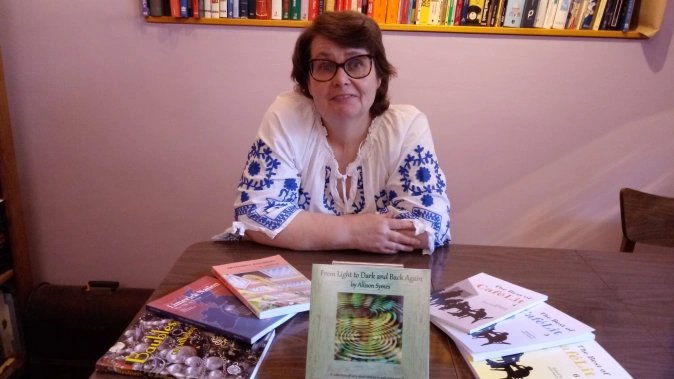Facebook – General
Why is it you never have as much time as you’d like for reading and/or writing? Time flies when I write, it drags when I’m doing the housework! There’s probably some natural law about this somewhere…
It’s important then to make the most of the time you do have. Never despise the fact you might only write or read for 15 minutes a day because those pockets of time mount up. At the of a week, you would have had 105 minutes (1 hour, 45 minutes) and you can complete a short story, some flash fiction etc.

Books – love them, don’t mind the format. Image via Pixabay

Great characters = great books. Image via Pixabay.

Books should keep you gripped and that is down to the characters. Image via Pixabay

A huge but lovely library. Image via Pexels

Books are a fantasic form of escapism. Image via Pixabay
Facebook – General
What do I like most about going to writing conferences? Difficult to say but I love the interaction with other writers and it is always good to know it’s not just you that’s faced rejections countless times. Also great to be able to celebrate any good publishing news with others and for them to do the same back. It is vital, I think, to know others do know the same frustrations with writing you feel and experience the same joys with it too.
Naturally, there is what you learn from the courses too, but I think you can’t beat the “buzz” of inspiration that comes from these things. You go home again looking forward to drafting out those new thoughts and ideas that came to you, maybe even try a new style of writing. The encouragement that comes from a good writing conference is invaluable for those times when writing doesn’t come easily or for whatever other reason, you’re not able to write as much as you’d like to.
Facebook – General
Will be off out on the train again this coming weekend so am automatically seeing it as “draft some more flash fiction stories” time! The great thing about writing is you are never short of things to create, edit, edit again, submit, receive rejections on, submit, receive acceptances on etc.
I must try and get some more work off to competitions this year. I have been shortlisted in a couple, which always gives me a buzz, but need to get back to this again. One great thing about competitions is having different themes to work to – I never mind a set theme. The challenge there is in coming up with something which meets the criteria but is engaging and different enough to hook the judge. (If you’ve hooked them, you’ve hooked potential readers).
Golden rules of competitions?
1. Make sure it is a genuine competition. Check out the background of it first.
2. Assuming it is a genuine competition, follow the rules. Stories ARE dismissed if rules are broken. (To do otherwise isn’t fair on other entrants who have stuck to them).
Oh and if you’re entering writing competitions, have fun, good luck and remember if nothing happens this time, you have still written a story that may suit a publication elsewhere. Waste nothing (but be prepared to rewrite).
Facebook – From Light to Dark and Back Again
One of the great things about flash fiction is that a few telling details can conjure up a whole world very quickly. It really is a question of feeding your reader the right information so they put two and two together. (Sometimes of course you throw in the odd red herring!).
The Truth in FLTDBA is a good example of the right detail being a pivotal part of the story. I don’t directly tell you this is an aliens from another world story. I tell you the name of the spaceship the alien flies in and you take the rest from there.
Facebook – From Light to Dark and Back Again
I use a variety of methods to generate stories including setting myself an opening line and taking the tale from there. I sometimes set myself a closing line and work out the story from a “backwards” point of view. Agatha Christie did this too.
What I’ve not done, and I guess I should give it a go at some point, is set myself an “in the middle” line and work either side of it! I do know of one competition a year at least that does set a middle line like that and I should imagine it’s an interesting challenge.
I’ve been brainstorming ideas for a third flash fiction collection and some of the lines I’ve come up with I will definitely save as closing lines. I’ll have a go at setting one or two as middle lines and see how I do!
Facebook – From Light to Dark and Back Again
Flash fiction can be used to reflect moods (your own and that of your characters). My story, They Don’t Understand, is an example of that. It is a poignant piece about an older man looking back at the life shared with his wife. I would also describe this as a character sketch.
I do sometimes write pieces that would never make a standard length short story (1500 words or so) but make ideal reflections on character (circa 100 to 300 words) and make an interesting sideline to my “standard” flash fiction stories.
I like character pieces as a good one will make you reflect on what the “star” has shared with you in the story and make you ponder as to whether you would do the same.
Goodreads Author Programme – Blog
I write flash fiction so my first priority is to tell an entertaining story yet keep the word count down.
One great way of doing this is to give the reader the information what they need to know, but no more than that. They are the ones who put two and two together. For example in one of my stories I mention the name of the spacecraft the alien narrator flies. It is all you need to know to get the gist of the story.
Great books across the genres have been doing this for years, long before flash came on to the scene (though I think flash, as a format, is the “flagbearer” for this now).
I love Agatha Christie, as I’ve mentioned before, for the puzzle element to her stories. I like authors who give me space to work things out (and later in the story I find out whether I was right with my conclusions or not). I also think those books are more memorable because you and me, as readers, are taking an active part in those books as we read them.
I also like P.G. Wodehouse for the details he seemingly without effort puts into his story. He sometimes refers to the meals being offered. I think that’s a great way to draw people into the story, it also gives an idea of the wealth and status of the characters.





























